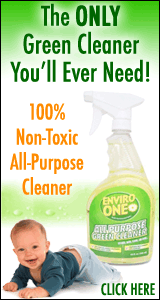Fabric Softeners and Scented Detergents Cause Illness and Pollution
What's Wrong With Fabric Softeners?
People are discovering that fabric softeners are some of the most toxic products made for daily household use. They contain chemicals (like chloroform, benzyl acetate and pentane) that are known to cause cancer and/or damage to lungs, brain, and nerves. These chemicals are even more dangerous when heated in clothes dryers. The toxic fumes then go into neighborhood air and everyone for blocks around is forced to breathe them in.
Fabric softener chemicals are made to stay in clothes fibers and slowly release for a very long time. That slow release of chemicals into the air affects the health of those wearing the clothes and of people around them. Many people take steps to becoming more healthy in their daily lives. They don't realize though that huge health risks are right under their noses. Among many poisonous ingredients in perfumes and cleaning products, fabric softeners are no stranger to these harmful chemicals either.
Some symptoms caused by fabric softener fumes are: tiredness that is not cured by resting, difficulty breathing, nervousness for no known reason, difficulty concentrating and remembering, dizziness, headaches, sick stomach, feeling faint, rashes and/or difficulty controlling body movements.
Babies, children, older people, and people who are already sick are especially hurt by these chemicals. Damage can be permanent, causing lifelong illness. Babies often react with rashes, frequent crying and/or diarrhea. Disinfectants can have the same effects. Experts suggest a possible connection between Sudden Infant Death ("crib death") and the use of these products for washing baby clothes and crib sheets and blankets.
Most fabric softeners have fragrance added to them, which makes them even more toxic.
What's Wrong With Scented Detergent?
(NOTE: Almost all detergents contain fragrance—even many that are labeled "no perfume" or "unscented"!)
95% of the chemicals used in fragrances are made from petroleum products. Many are known to cause cancer, birth defects, and damage to lungs, brain, and nerves.
Some chemicals commonly used in fragrances, such as toluene, are listed as hazardous waste worldwide.
Fragrances are not regulated by any government or health agency. There is no law that requires fragrance ingredients to be put on product labels. For example, paradichlorobenzene is a cancer-causing chemical used in many "air fresheners", as well as in some pesticides. U.S. law requires that it be listed as an active ingredient in pesticides, but it does not have to be listed at all on "air freshener" labels.
The more often you breathe in these chemicals (24 hours a day if they are in clothes and bedding), the more likely you are to permanently damage your body. They also add to the damage done by chemicals present at work and in public places. You may feel tired, breathless or lightheaded, sick to your stomach, or get a headache, and not realize these are early signs of chemical poisoning.
If you keep using toxic products, you may become so sick you can no longer work or even leave your home. Some people have epileptic seizures when they are anywhere near someone wearing perfume or scented products, because their nervous systems have been so damaged by these and other chemicals.
Regular users of scented products often say they "can hardly smell it." These products deaden your natural ability to smell, making you want to use more and stronger fragrances. Meanwhile, what you think is a light fragrance is suffocating and nauseating people around you.
What Can Be Used Instead?
In supermarkets, soap or detergent labeled "no fragrance" is usually the safest choice. Products labeled "no perfume" or "unscented" often do actually contain fragrance. However, a few, like Dr. Bronner's Unscented Baby Castile liquid soap and Granny's Unscented Detergent, are truly unscented. If your supermarket does not have any detergent or soap without fragrance, ask them to get some, or try a health food store. Some people use only plain baking soda. (NOTE: Please see our Guidelines for Nontoxic Living page for product listings and online ordering through Amazon!)
To soften fabrics and reduce static cling, add a cup or more of plain baking soda to each wash.
To kill germs, a hot water wash and the high heat of the clothes dryer are safer than disinfectant, because they leave no dangerous chemicals in clothes and bedding. Hanging things out in the sun is also effective.
Be Kind to Yourself, Your Family, Friends, and Neighbors.
Be Kind to the Environment.
Use Unscented and Chemical-Free Products!
Sources
Chemical Exposures: Low Levels and High Stakes
Prof. Nicholas Ashford and Dr. Claudia Miller
Univ. of Texas Health Science Center
Van Nostrand Reinhold, 1997
Neurotoxins At Home And in The Workplace (Report 99-827)
Committee on Science and Technology
U.S. House of Representatives
Sept. 16, 1986
1991 Environmental Protection Agency Study Paper #A312
Tired or Toxic?
Sherry Rogers, M.D.
Prestige Publishing
Syracuse, New York, 1990
The New Reactor
Newsletter of The Environmental Health Network
P. O. Box 1155
Larkspur, CA 94977
(415) 541-5075
NOTE: The information provided on this page is based on the pamphlet, "Neighborhood Health Notice", distributed by "Breath of Fresh Air" – used by permission.
Please feel free to copy this pamphlet and distribute it!










